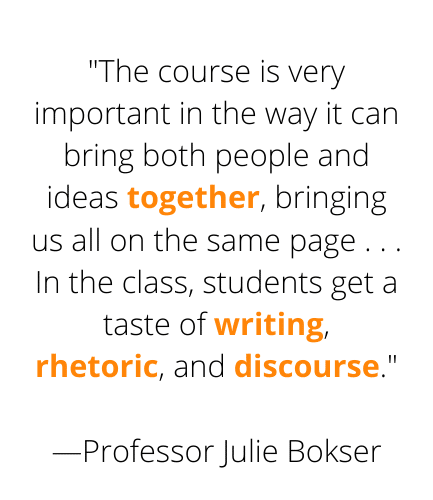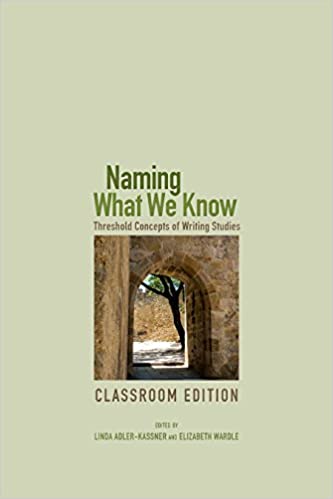Every Autumn Quarter, the WRD Department offers WRD 500: Proseminar, the only required course that every MAWRD student must take. The course is designed to introduce students to the theories, concepts, and writing of graduate-level work in writing studies. This year, Professor Julie Bokser will lead Proseminar on Tuesdays from 6:00 to 9:15 pm. We checked in with Professor Bokser over email in order to help new WRD students understand what to expect from WRD 500.
The Value of a Required Course
Because all MAWRD students take Proseminar usually within the first half of their program, the course unites graduate students with a shared body of theoretical and practical knowledge.

“I think the course is very important in the way it can bring both people and ideas together, bringing us all on the same page. The course provides an overview of the kinds of things we study in WRD. Many students come because one of those things was the appeal, and don’t know much about the other two. In the class, students get a taste of writing, rhetoric, and discourse,” said Professor Bokser.
The class also serves to unite students at the beginning of their time in the program so students can meet the peers they will likely share many classes with over the next few years. For many students, the course offers an important opportunity to join the WRD community.
“The students get to know each other, so they develop a cohort of peers they’ll be studying with going forward. And finally, when they finish the course, they should understand how graduate-level learning works and what is expected,” said Professor Bokser.
WRD 500 Readings & Projects
As “an introduction to writing studies, rhetorical theory, and discourse,” WRD 500 revolves around critically important readings and writing tasks that engage students with contemporary issues within the field of writing studies. In addition to a medium-length final paper, students also complete three shorter writing assignments called Summary/Synthesis/Response (SSR) papers.
“We have a number of Summary/Synthesis/Response papers which are really important. They ask students to do exactly what the title suggests—and it’s hard! Learning how to distill a long piece into a few sentences and then connect it to other scholarship is the foundation of graduate level work,” said Professor Bokser.

The SSR papers provide a space for students to actively think through and engage with the week’s readings while making connections between foundational concepts. Previously, WRD 500 has included readings from Naming What We Know: Threshold Concepts of Writing Studies by Linda Adler-Kassner and Elizabeth Wardle, which introduces many of the foundational concepts in the field. Students have also read foundational pieces, such as those on the rhetorical situation by Lloyd Bitzer and Richard Vatz. Additional concepts discussed in the course have covered a broad range of topics, including discourse communities, multiliteracies, rhetorical listening, feminist perspectives, and social and historical contexts for the discipline.
“As a unit, all of the faculty who teach Proseminar have been teaching it in a fairly consistent manner for a number of years now, adapting our individual course but using the same core approach and readings. I think this is a good approach because it provides a consistent introduction to the field. In general, the readings offer exposure to ‘seminal’ works in the field, while also introducing important recent trends or rethinkings of classic constructs,” said Professor Bokser.
A Strong Foundation
Most importantly, WRD 500 creates a solid foundation on which students can build and shape their time in the MAWRD program. Whether students intend to follow one of the program’s concentrations or broadly explore their interests, WRD 500 can help spark curiosity in some of the central concerns of writing studies today.
“The course should help students understand what the options are for study and learning in the program, and where they might want to focus. It often helps students try something they actually didn’t originally enroll for, such as when a student who wants to teach decides to pursue a professional writing course or internship,” said Professor Bokser.
